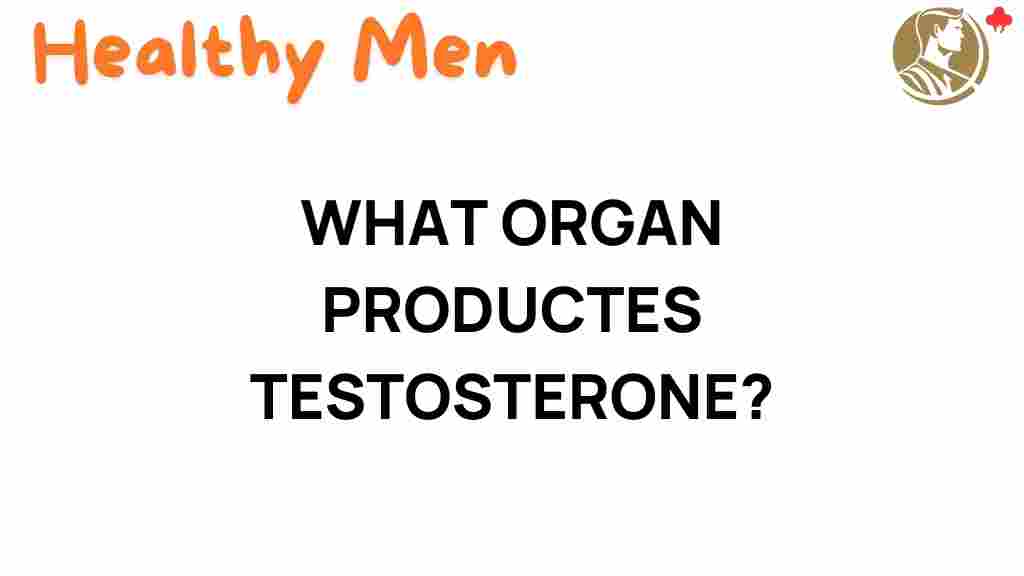Unveiling the Secrets: What Organ Produces Testosterone?
Testosterone is a crucial hormone that plays a significant role in the health and wellness of individuals, particularly in male health. Understanding the biology and the organ that produces testosterone is essential for anyone interested in the endocrine system and how hormones affect our bodies. This article will delve into the intricacies of testosterone production, its functions, and its importance in maintaining a healthy reproductive system.
Understanding Testosterone and Its Importance
Testosterone is an androgen, a type of hormone that is primarily associated with male characteristics and reproductive functions. It is produced mainly in the testes, but also in smaller amounts in the adrenal glands and ovaries in females. Testosterone is critical for:
- Development of male reproductive tissues
- Promotion of secondary sexual characteristics
- Regulation of libido
- Bone mass maintenance
- Muscle strength and mass
- Red blood cell production
Low testosterone levels can lead to various health issues, including fatigue, depression, reduced muscle mass, and decreased libido. Understanding what organ produces testosterone can help in diagnosing and treating these conditions.
The Endocrine System: A Key Player in Hormone Production
The endocrine system is a network of glands that produce and secrete hormones directly into the bloodstream. These hormones regulate many bodily functions, including metabolism, growth, and mood. Key components of the endocrine system involved in testosterone production include:
- Hypothalamus: This gland signals the pituitary gland to produce luteinizing hormone (LH) and follicle-stimulating hormone (FSH).
- Pituitary Gland: Produces LH, which stimulates the testes to produce testosterone.
- Testes: The primary organ responsible for testosterone production in males.
- Adrenal Glands: Produce some testosterone, especially in females.
How Testosterone is Produced
The process of testosterone production involves several steps that occur in the endocrine system:
- Hypothalamic Pulses: The hypothalamus releases gonadotropin-releasing hormone (GnRH) in pulses.
- Stimulation of Pituitary Gland: GnRH stimulates the anterior pituitary gland to produce LH and FSH.
- LH Activation: LH travels through the bloodstream to the testes, stimulating Leydig cells to produce testosterone.
- FSH Role: FSH works alongside testosterone to support spermatogenesis, the process of sperm production.
This hormonal cascade is a prime example of how the endocrine system functions to regulate essential biological processes in the body.
The Role of Testes in Testosterone Production
The testes are the primary organs responsible for testosterone production in males. Located in the scrotum, the testes have several important functions:
- Spermatogenesis: The production of sperm cells.
- Hormone Secretion: Leydig cells in the testes produce testosterone in response to LH from the pituitary gland.
- Temperature Regulation: The scrotum keeps the testes at a temperature lower than the body’s core temperature, which is critical for optimal sperm production.
Factors Affecting Testosterone Levels
Several factors can influence testosterone levels in the body, including:
- Age: Testosterone levels typically peak in late adolescence and early adulthood, then gradually decline with age.
- Health Conditions: Conditions such as obesity, diabetes, and hypogonadism can lower testosterone levels.
- Lifestyle Choices: Alcohol consumption, smoking, and lack of physical activity can negatively impact hormone levels.
- Stress: Chronic stress leads to elevated cortisol levels, which can inhibit testosterone production.
Testing for Testosterone Levels
To evaluate testosterone levels, healthcare providers may recommend a blood test. This test measures total testosterone and sometimes free testosterone levels. The following steps are typically involved:
- Consultation: Discuss symptoms and health history with a healthcare provider.
- Blood Sample: A blood sample is taken, usually in the morning when testosterone levels are highest.
- Results Analysis: The healthcare provider analyzes the results and discusses them with the patient.
Understanding testosterone levels can help identify potential health issues and guide treatment options.
Symptoms of Low Testosterone
Low testosterone levels can manifest in various ways. Some common symptoms include:
- Decreased libido
- Fatigue
- Depression or mood changes
- Reduced muscle mass
- Increased body fat
- Reduced bone density
If you experience these symptoms, it is crucial to consult a healthcare professional for proper evaluation and potential treatment.
Treatment Options for Low Testosterone
There are several treatment options available for individuals diagnosed with low testosterone. These include:
- Testosterone Replacement Therapy (TRT): Involves administering testosterone through injections, patches, or gels.
- Lifestyle Changes: Improving diet, increasing physical activity, and managing stress can help boost testosterone levels naturally.
- Medication: In some cases, medications may be prescribed to stimulate testosterone production.
It is essential to discuss these options with a healthcare provider to determine the most appropriate course of action.
Maintaining Healthy Testosterone Levels
For optimal health and wellness, maintaining healthy testosterone levels is critical. Here are some tips to support hormone balance:
- Exercise Regularly: Engage in both aerobic and strength training exercises.
- Eat a Balanced Diet: Include healthy fats, proteins, and plenty of fruits and vegetables.
- Manage Stress: Practice relaxation techniques such as meditation, yoga, or deep breathing exercises.
- Get Enough Sleep: Aim for 7-9 hours of quality sleep each night.
- Avoid Substance Abuse: Limit alcohol and avoid recreational drugs.
By implementing these strategies, individuals can help maintain healthy testosterone levels and enhance their overall health and wellness.
Conclusion
Understanding what organ produces testosterone is vital for anyone interested in male health and the complexities of the endocrine system. The testes play a crucial role in testosterone production, and maintaining healthy levels of this hormone is essential for overall well-being. By recognizing the factors that affect testosterone levels and implementing healthy lifestyle choices, individuals can support their hormonal health and enjoy the benefits that come with balanced testosterone levels.
For more information on hormonal health and wellness, consider exploring resources from reputable health organizations. You can check this link for further insights.
Additionally, if you’re curious about the nuances of the endocrine system and how hormones interact, feel free to visit this informative page.
This article is in the category Fitness and created by healthymen Team
